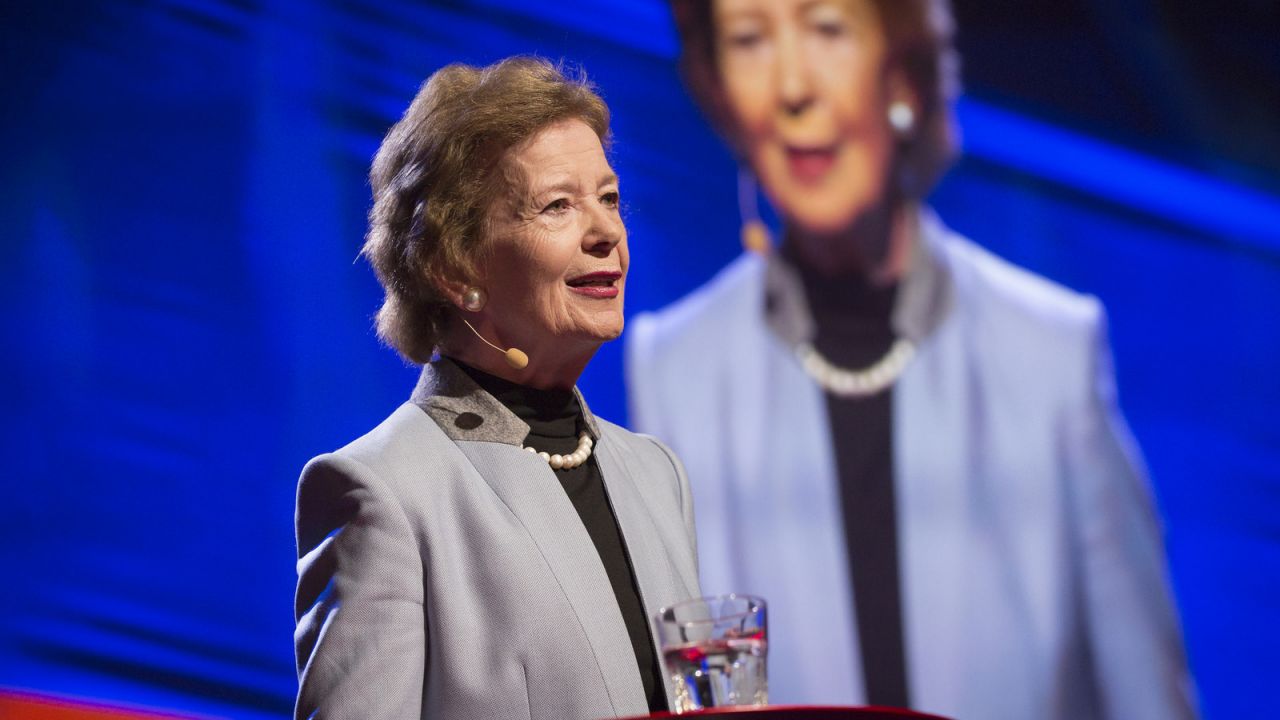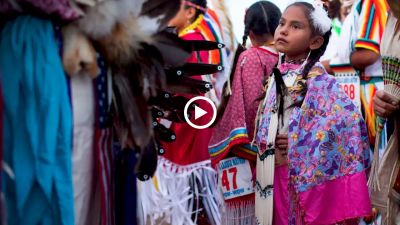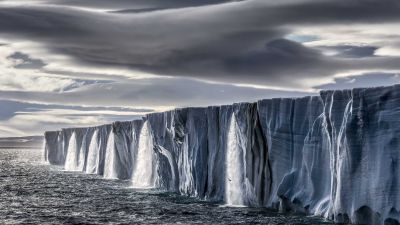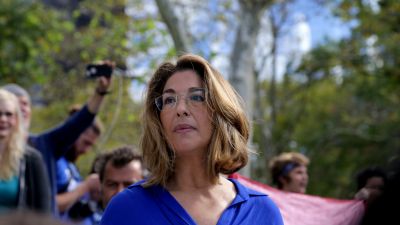
Mary Robinson speaks at TEDWomen2015 in Monterey, California. (Photo by Marla Aufmuth/TED)
This post first appeared at the TED Blog.
Two years ago, former president of Ireland Mary Robinson graced the TEDWomen stage with a moving talk about why climate change is a threat not only to our environment, but also to the human rights of many poor and marginalized people around the world.
Mary is an incredible person who inspires me greatly. Besides being the first female president of Ireland, she also served as the UN high commissioner for human rights from 1997 to 2002. She now leads a foundation devoted to climate justice. She received the Presidential Medal of Freedom from President Obama, is a member of the Elders, a former Chair of the Council of Women World Leaders and a member of the Club of Madrid.
“I came to [be concerned about] climate change not as a scientist or an environmental lawyer,” she told the TEDWomen crowd in California. “It was because of the impact on people, and the impact on their rights — their rights to food and safe water, health, education and shelter.”
She told stories of the people she met in her work with the United Nations and later on in her foundation work. When explaining the challenges they faced, they kept repeating the same pervasive sentence: “Oh, but things are so much worse now, things are so much worse.” She came to realize that they were talking about the same phenomenon — climate shocks and changes in the weather that were threatening their crops, their livelihood and their survival.
In the wake of Hurricanes Harvey and Irma in the United States, and extreme monsoons in South Asia, I reached out to Mary to get an update on her work and where things stand now in terms of climate justice and the global fight to curb climate change. Despite a busy week attending this week’s United Nations General Assembly and other events, she took the time to answer my questions via email.
Pat Mitchell: Horrific hurricanes like Harvey, Irma and now Maria, are bringing the issue of climate change to the doorsteps of a country that recently dropped out of the Paris climate agreement. What would you say to Americans about climate change and the actions of their government in 2017?
Mary Robinson: In the past few weeks alone, we have seen the physical, social and economic devastation wrought on some American cities and vulnerable communities across the Caribbean by Hurricanes Harvey and Irma, and the death and destruction caused by monsoons across South Asia. The American people know from previous experience, such as Hurricane Katrina in 2005, that some people affected will be displaced from their homes forever. Many of these displaced people are drawn to cities, but the capacity to integrate these new arrivals in a manner consistent with their human rights and dignity is often woefully inadequate — reflecting an equally inadequate response from political leaders.
The profound injustice of climate change is that those who are most vulnerable in society, no matter the level of development of the country in question, will suffer most. People who are marginalized or poor, women and indigenous communities are being disproportionately affected by climate impacts.
And yet, in the US the debate as to whether climate change is real or not continues in mainstream discourse. Throughout the world, baseless climate denial has largely disappeared into the fringes of public debate as the focus has shifted to how countries should act to avoid the potentially disastrous consequences of unchecked climate change. For many years, the US has positioned itself as a global leader in science and technology and yet in seeking to leave or renegotiate the Paris Agreement, the current administration is taking a giant leap backward, both in terms of science-based policy making and in terms of international solidarity and cooperation.
However, while the national government is going backward, we are seeing citizens and leaders across the country picking up the slack. I see many American people who remain determined to ensure the US plays its role in the fight against climate change. For Americans who are rightly concerned about the administration’s direction on climate change, I would say that there are still many reasons to be optimistic. The “We’re Still In” initiative offers a tangible demonstration of that desire on the part of concerned citizens to ensure that the US emerges as a leader on climate action, regardless of the approach of the current administration. States, cities, universities and businesses are committing to ambitious action to tackle climate change, to ensure clean and efficient energy services and uphold US commitments under the Paris Agreement.
PM: As you pointed out in your TED talk, the people who are suffering the most from climate change are those who don’t have the means to escape catastrophic events or rebuild after they have occurred. Can you talk a bit about efforts your organization and others are involved in to help those who are the most affected by climate change, but often are the least responsible for the human actions that have caused it?
MR: As with many of the most severe storms to impact communities in recent years — including in the US with Katrina, Sandy and Ike — it is the poorest people who have suffered the worst impacts from Harvey and Irma. The people who the climate justice movement is for are the people who have the least capacity to protect themselves, their families, their homes and their incomes from the impacts of climate change, and indeed climate action policies that are not grounded in human rights. These are also the people who have the hardest time rebuilding their lives in the wake of these more frequent and intense disasters as they do not have adequate access to insurance, savings or other livelihood options necessary to provide resilience. In many cases, families lose everything.
If we then consider the devastation wrought by Irma in the Caribbean, where poverty rates are much higher than the US, we begin to understand the great injustice of climate change. People living around the world, in communities which have never seen the benefits of industrialization or even electrification, face the harshest impacts of climate change and have the most limited capacity to recover.
In seeking to advance climate justice, my foundation and other organizations which share our concerns, seek to ensure that the voices of these communities are heard and understood by those crafting the global and national response to the climate crisis to ensure that decisions are participatory, transparent and respond to the needs of the most vulnerable people in our communities. We must enable all people to realize their right to development and to benefit from the global transition to a sustainable, cleaner and more equitable future. Solutions to the climate crisis that are good for the planet but cause further suffering for people living in poverty must not be implemented.
PM: What is the number one issue involving climate change that we should all be focused on right now as regards human rights and climate justice in the world?
MR: There are many pressing issues which must be addressed to advance climate justice. For instance, over one billion people today live in energy poverty. The global community must ensure that appropriate financing and renewable technologies are available to allow all people to enjoy the benefits of electrification sustainably. Similarly, a compendium of evidence-based climate solutions published this summer highlighted that the most effective approach to reducing greenhouse gas emissions is through educating girls and providing for family planning*. Climate change impacts women differently to men and exacerbates existing inequalities. Empowering women and girls in the global response to climate change will result in a fairer world and better climate outcomes. This must begin by ensuring women are enabled to meaningfully participate in decision-making processes related to climate action throughout the world.
Given the recent storms and resulting devastation, one of the most pressing issues to be addressed regarding the rights of those most vulnerable to climate change is the need to ensure the necessary protections are in place for people displaced by worsening climate impacts. There can be no doubt that climate change is a driver of migration, and migration owing to climate impacts will increase in the coming years. Increasingly severe and frequent catastrophic storms or slow-onset events like recurrent drought, sea level rise or ocean acidification will result in people’s livelihoods collapsing, forcing them to seek better futures elsewhere. The scale of potential future migration as a result of climate change must not be underestimated. In order to ensure that the global community is prepared to protect the wellbeing and dignity of people displaced by climate change, concrete steps must be taken now. It would be very important that the Global Compact on Migration and Refugees, currently being negotiated at the UN, recognizes the challenge of addressing displacement resulting from climate change.
PM: In a speech earlier this month, you talked about some of the innovative ideas that are being broached around the world to address climate change and you said, “The existential threat of climate change confronts us with our global interdependence. It cannot be seen as anything other than a global problem, and each nation must play an appropriate part to tackle it.” What do you think is the most important thing the US must do to address the problem?
MR: The US must continue to support international action on climate change. No country alone can protect its citizens from the impacts of climate change — it will only be through unprecedented international solidarity, backed up by financial and technological support, that some of the most vulnerable countries will be able to chart a sustainable development pathway for their country. It is in the interests of the US provide this support.
Without it, developing countries are faced with a choice between prohibitively expensive sustainable development and readily accessible fossil-fuel-based development. They will choose the latter and who would blame them — they need to lift large numbers of their people out of poverty and provide essential services like health care, education and fresh water — without international support, they will have no choice but to use fossil fuels. This would result in even more intense Atlantic hurricanes, longer and more severe drought across the western US and the inundation of coastal cities from sea level rise. In order to protect American citizens, the US must play their role as a global citizen. Solidarity and interdependence are not new ideas, but in the current climate of rising nationalism, they are innovative and potentially transformative.
PM: What are some of the innovative solutions that you are seeing around the world that we should know about?
MR: When we think about innovation, we usually focus on technology. However, most of the technologies we need to avert the climate crisis are already available to us. What is lacking is the political will to enact the necessary global transition to a safer and fairer future for all. Perhaps we should be more focused on innovation in terms of global governance.
For instance, in some countries like Wales and Hungary there is an office that represents the interests of future generations in national decision-making. When viewed through an intergenerational lens, the urgent need to ensure sustainable development for all people and stabilize the climate becomes clear. Decisions taken today that undermine the well-being of future generations become inexcusable. Intergenerational equity can help to inform decision making at the international level as well, and provide a unifying focus for international negotiations. It is a universal principle that informs constitutions, international treaties, economies, religious beliefs, traditions and customs. Putting this principle into action and allowing it to inform how we negotiate and govern would be a very innovative change.
PM: What can regular people do to fight climate change and work for environmental justice?
MR: I believe the most important thing a person can do is to appreciate their role as a global citizen. Ultimately, the fight against climate change will not be won by a technological silver bullet or a mass recycling campaign, but rather by an appreciation among all people that we have to live sustainably with the Earth and with each other. We need empathy for those communities on the front lines of climate change, and for those seeking to realise their right to development in the midst of a changing climate, and this empathy must help to guide how we act, how we consume and how we vote.
Watch Robinson’s TED Talk and visit her website to find out more about her work and how you can get involved.




